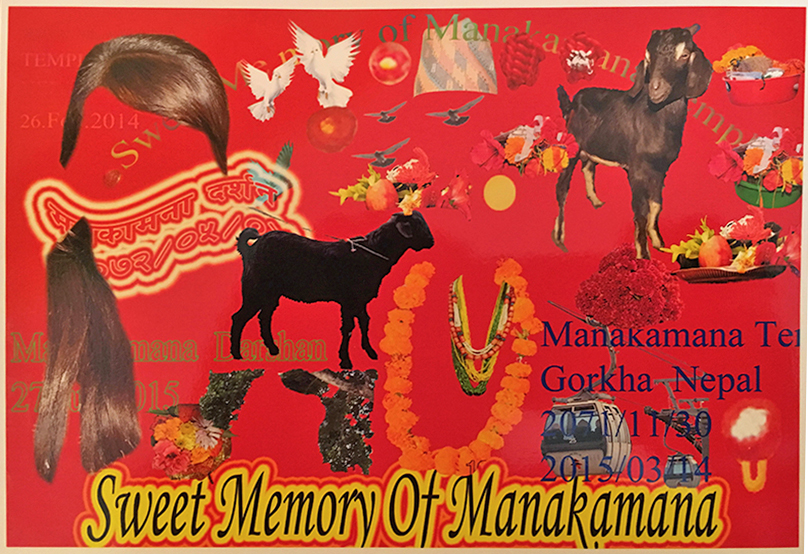Vie scientifique | Séminaires / Conférences
The Eternal Time of Photography: Comparative Perspectives from South Asia
Christopher Pinney
Salle 737, 54 boulevard Raspail 75006 Paris
Dans le cadre de l'atelier thématique du CEIAS « Approches anthropologiques et historiques du sensible »
The boldest 20thcentury theorization of photography, by Walter Benjamin, has pitted photography against the cultic. Benjamin’s approach was hardly ethnographic and he often has cause to lament the divergence between the effects photography should have and the uses to which it was actually put. The massed studios, of the Nepali pilgrimage destination of Dakshinkali seem intent on trying to supress the contingency that so enthused Benjamin. Dakshinkali images speak to that repetitive and ‘arthritic’ nature of ritual performance that Maurice Bloch has described so well, and through the mobilization of repetitive structures and actions attempt to conjure what Eliade described as illud tempus. Dakshinkali photography provides an entrance into a “sacred time” which is “indefinitely recoverable, indefinitely repeatable”. How should be understand the time and the event of photography ?
Christopher Pinney is Professor of Anthropology and Visual Culture at University College London. He has held visiting positions at the Australian National University, University of Chicago, University of Cape Town, Northwestern University, Boğaziçi University (Istanbul), and Jagiellonian University (Krakow). His research interests cover the art and visual culture of South Asia, with a particular focus on the history of photography and chromolithography in India. He has also worked on industrial labor and Dalit goddess possession. Amongst his publications are Camera Indica (1997), ‘Photos of the Gods’ (2004), The Coming of Photography in India (2008), Photography and Anthropology (2011), The Waterless Sea (2018), and Lessons from Hell (2018).
Les sites du CEIAS
- SAMAJ | The South Asia Multidisciplinary Academic Journal
- CEIAS - Facebook
- CEIAS - Twitter
- CEIAS - Newsletter
- Le Bulletin de la Bibliothèque
- Régionalisme & cosmopolitisme
- DELI | Dictionnaire Encyclopédique des Littératures de l’Inde
- DHARMA | The Domestication of “Hindu” Asceticism and the Religious Making of South and Southeast Asia
- TST | Texts Surrounding Texts
- STARS | Studies in Tamil Studio Archives and Society 1880-1980
- I-SHARE | The Indian Subcontinent’s Shared Sacred Sites
- Sri Lanka et diasporas
- Sindhi Studies Group
- Carnet du Master Études asiatiques
- Master “Asian Studies”
- Social Sciences Winter School in Pondicherry
- Caste, Land and Custom
- Musiques indiennes en terres créoles
 Actualités
Actualités
Devenir juifs : conversions et assertions identitaires en Inde et au Pakistan
 Débat - Mardi 9 mai 2023 - 14:00Présentation« L’an prochain à Jérusalem ! », scande un homme portant une kippa dans une synagogue de Karachi au Pakistan. Ses paroles sont répétées en chœur par les membres de sa communauté, un groupe comptant près de trois cents personnes qui s’autodésignent par (...)(...)
Débat - Mardi 9 mai 2023 - 14:00Présentation« L’an prochain à Jérusalem ! », scande un homme portant une kippa dans une synagogue de Karachi au Pakistan. Ses paroles sont répétées en chœur par les membres de sa communauté, un groupe comptant près de trois cents personnes qui s’autodésignent par (...)(...)
Le Centre d'études sud-asiatiques et himalayennes (Cesah), nouveau laboratoire de recherche (EHESS/CNRS) sur le Campus Condorcet
Échos de la recherche -Depuis le 1er janvier 2023, l'EHESS, en tant que co-tutelle, compte un nouveau centre de recherche né de la fusion du Centre d'études de l'Inde et de l'Asie du Sud (CEIAS - EHESS/CNRS) et du Centre d’études himalayennes (CEH - CNRS) : le Centre d'études sud-asiatiques et h (...)(...)
Centre d'Études de l'Inde et de l'Asie du Sud
UMR8564 - CNRS / EHESS
54 boulevard Raspail
75006 Paris, France
Tél. : +33 (0)1 49 54 83 94
Communication :
nadia.guerguadj[at]ehess.fr
Direction :
dir.ceias[at]ehess.fr
La bibliothèque du CEIAS
Maison de l'Asie
22 avenue du Président Wilson 75016 Paris
54 boulevard Raspail
purushartha[at]ehess.fr



